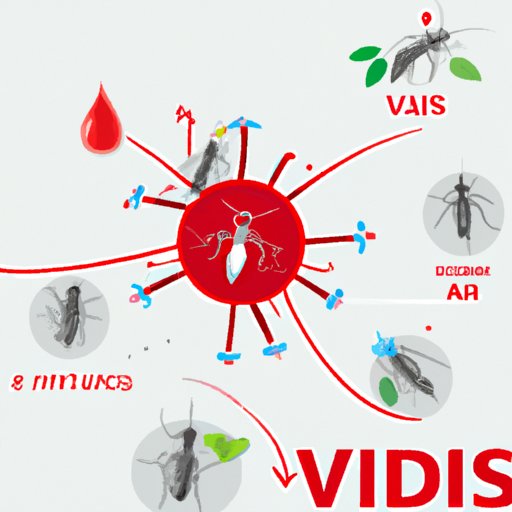
Can You Get AIDS From a Mosquito?
HIV transmission has long been associated with mosquitoes, but is there any truth to this widely believed myth? In this article, we will debunk the myth and explore the science behind mosquito-borne diseases, specifically HIV transmission.
Debunking the Myth: The Truth About Mosquitoes and HIV Transmission
It is a common belief that mosquitoes can transmit HIV from one person to another, but this is simply not true. According to the Centers for Disease Control and Prevention (CDC), there has never been a documented case of HIV transmission from a mosquito bite.
The reason for this is because mosquitoes do not carry HIV in their saliva or inject it into humans when they bite. HIV is a fragile virus that cannot survive outside the human body for very long, making mosquito transmission impossible.
Viral Transfer: Understanding How Diseases are Spread by Mosquitoes
Mosquitoes are known vectors of many viral and parasitic diseases such as malaria, dengue fever, Zika virus, and yellow fever. When a mosquito feeds on an infected person, the virus enters the mosquito’s body and multiplies, eventually spreading to other people when the mosquito bites them.
This transfer of disease-causing pathogens from one host to another is known as vector-borne disease, and it is a significant public health concern. In addition to the diseases mentioned above, other mosquito-borne diseases include West Nile virus and chikungunya virus.
The Science of Mosquito-borne Diseases: What You Need to Know About HIV and Mosquitoes
It is essential to understand that HIV is different from other mosquito-borne diseases like malaria and dengue fever. HIV is a human immunodeficiency virus that can only be transmitted through specific bodily fluids. These include blood, semen, vaginal fluids, or breastmilk.
For HIV transmission to occur, these fluids must come into contact with a mucous membrane or damaged tissue, like a cut or sore, in another person. Therefore, HIV transmission through a mosquito bite is impossible since the virus cannot survive in a mosquito and is not present in its saliva.
Dissecting the Risks: How Likely Are You to Get HIV from a Mosquito Bite?
The risk of getting HIV from a mosquito bite is incredibly low. As mentioned earlier, HIV cannot survive outside the human body for long. Even if a mosquito feeds on an HIV positive person, the virus will not survive in the mosquito’s gut, and it will not be injected into a subsequent host.
In addition, HIV is a very fragile virus that cannot survive in mosquito saliva. HIV is also not present in sweat, tears, or saliva, reducing the risk even further.
According to the CDC, there has never been a documented case of HIV transmission from a mosquito bite anywhere in the world.
Protecting Yourself: Preventing Mosquito-borne HIV Transmission
Although getting HIV from a mosquito bite is virtually impossible, it is essential to protect oneself from mosquito bites to prevent other mosquito-borne diseases.
To prevent mosquito bites, you can use mosquito repellents, wear long-sleeved shirts and pants, and avoid areas with high mosquito populations, especially during peak biting times such as dawn and dusk. In addition, it is crucial to get tested for HIV regularly to detect the virus early and begin making necessary treatment decisions.
Conclusion
While mosquitoes can transmit many viral and parasitic diseases, including dengue fever, Zika virus, and malaria, there is no evidence that they can transmit HIV. The risk of getting HIV from a mosquito bite is incredibly low, and it is crucial to protect oneself from mosquito bites to prevent other mosquito-borne diseases. By following simple preventative measures and getting tested regularly, individuals can safeguard their health from both mosquitoes and other diseases.




